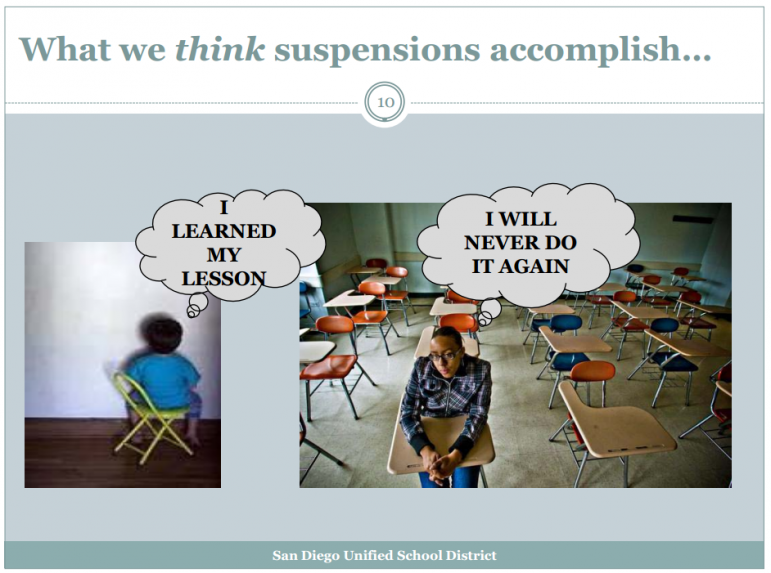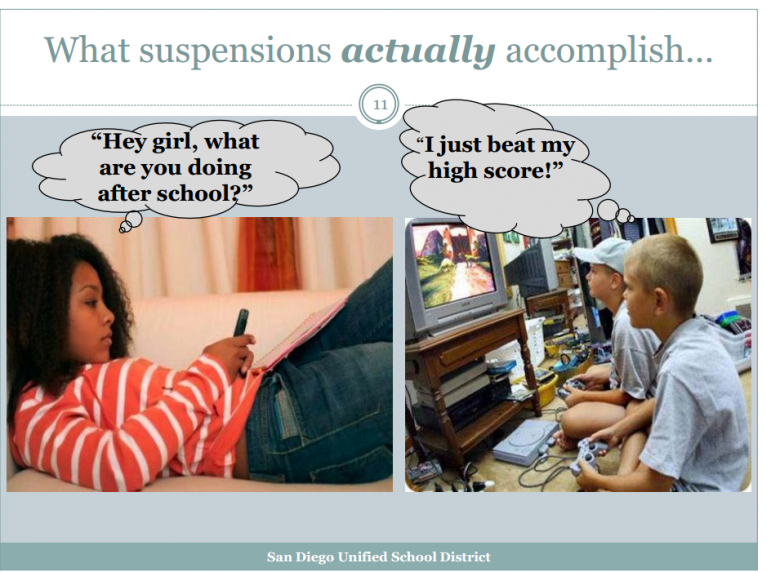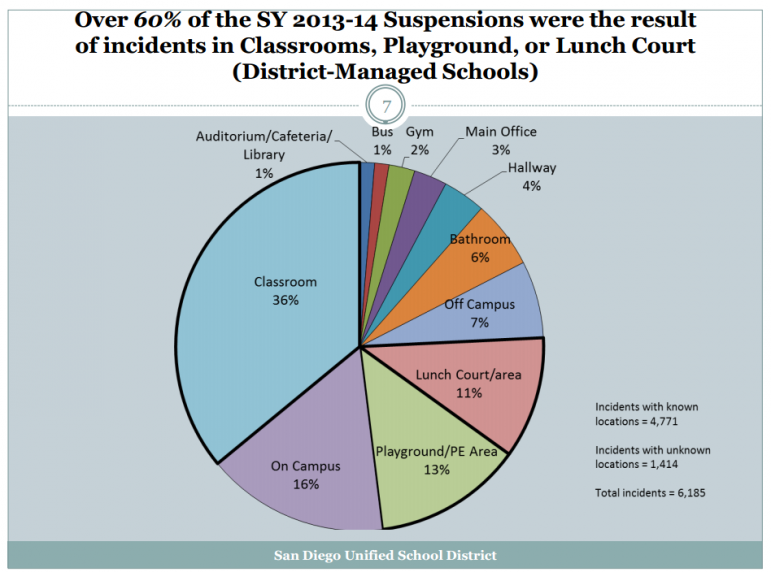A report by the Harvard researchers who visited San Diego Unified says it best: The tough-on-crime, zero tolerance policies America used to fight the war on drugs in the past few decades shifted to schools.
“Now, with 20 years of experience and insight into how this approach to school discipline has worked on the ground, our learning is unequivocal: we were wrong,” the report reads.
The Harvard team came to San Diego this spring to take a look at five specific problems facing the district: limited access to early childhood education, difficulties reaching all English learners, racial disparities in graduation rates and discipline policies that disproportionately harm black and Latino students, and those with disabilities.
At last week’s school board meeting, the district presented Harvard’s recommendations, and its plan for what’s it going to do to help. These are problems facing all urban districts, to varying extents.
One specific recommendation includes creating an early warning system to identify students falling behind on credits. This is especially important, the report said, because in two years the district will up its graduation requirements to include more college-prep courses.
In terms of school discipline, the report called on San Diego Unified to increase its collective accountability. The Harvard team pointed to Baltimore, where the superintendent dropped 26,000 yearly suspensions to under 10,000 in three years by supporting principals as they worked to make changes and holding them accountable for progress.
Tuesday night’s board meeting also offered a bonus presentation – a look at what the district will do to keep more students in the classroom instead of suspending them for minor violations. Some of that plan is based on recommendations the Harvard team made.
Kids can’t learn if they’re not in class. And when it comes to disciplinary practices that keep kids out of San Diego Unified, black and Latino students are losing the most.
The problem isn’t new to the district. In the late ’70s, the Office of Civil Rights started tracking out-of-school suspensions in San Diego Unified. In 1981, the office found patterns of “disciplinary sanctions imposed on students in a manner which discriminates against minority children,” in the district.
About 10 years later, the district created one of many task forces, to monitor the problem and make recommendations on how to improve it.
The protracted efforts, and their limited successes, illuminate just how stubborn the disparities are.
Trustee John Lee Evans said this is one area where it recognizes its shortcoming.
Here’s a snapshot, based on the school board’s promise to ramp up the efforts:
Black students comprise 10 percent of the student body and 25 percent of suspensions and 21 percent of expulsions. They’re more than three and half times likely to be suspended than their white peers.
Latinos make up 46 percent of enrollment, but 55 percent of suspensions and 60 percent of expulsions.
Students with special needs make up only 10 percent of the student body, but 34 percent of suspensions, said Joe Fulcher, the chief student services officer who’s been charged with looking after these students.
Not every student who is suspended faces a future behind bars. But students suspended repeatedly are more likely to be involved with the juvenile justice system, drop out of school and repeat a grade, according to the district.
And, of course, the district loses per-pupil funding for every student who drops out.
These two slides from the district are a little campy, but they make an important point: Teachers and staff might think they’re punishing students, but if the goal is to redirect students, and to inspire them to strive higher, the efforts fall flat.
So what is the district going to do to tackle the suspensions? Here’s a hint. There are no immediate plans to deal with the elephant in the room: “willful defiance.”
Willful defiance is a catch-all reason for suspending kids. It can be used to send kids home for relatively petty rule violations like refusing to do homework or acting disrespectfully. It’s had such a disparate impact on black and Latino students that one California assemblyman sponsored a bill to limit its use statewide.
After Fulcher’s presentation to the school board on Tuesday, trustee Marne Foster asked what the district was going to do about willful defiance.
In response, Fulcher essentially restated the problem: “Because it’s such a catch-all category, it’s hard to develop strategies and interventions. That’s something (my team and I) need to sit down and talk more about, to be honest with you,” he said.
Vernon Moore, the district’s executive director of student services told me in January that limiting the use of the willful defiance punishment alone won’t stop the behavior that causes it.
And Danny Blas, a teacher at Kearny High School, said that even though he doesn’t kick students out of class for willful defiance, he doesn’t think lawmakers should have the right to take tools out of teachers’ hands that can help them manage classroom behavior.
Blas’ reasoning fits with a national survey in which superintendents said teachers were the most likely group to object to policies that would limit student suspensions.
It also helps frame one of the reasons why it’s challenging to reduce suspensions. Last year, 36 percent of suspensions – the largest share of the pie – happened in the classroom.
This means that reducing suspensions starts with training teachers to deal with behavior effectively, before they kick kids out of class. To this end, a big piece of the district’s efforts will include more training for teachers and principals to better handle classroom defiance.
This is just one piece of the district’s plan. In reality, what it’s asking for is an entire paradigm shift in the way it looks at discipline.
Instead of focusing on the broken rules and punishment, the new approach would mean focusing on the harm that was done and working to repair the damage. This, in short, is restorative justice.
This approach to discipline has already been implemented effectively at Cherokee Point, an elementary school in City Heights that has served as a model for what San Diego Unified wants to do districtwide.
But for the shift to happen, principals must be persuaded that suspensions are a problem, and they need to lead the efforts to change their school culture.
It means building up support around students and identifying when they’re slipping, so they can get the help they need before they act out. It means understanding why students misbehave and letting go of scripted reactions for the sake of punishment.




